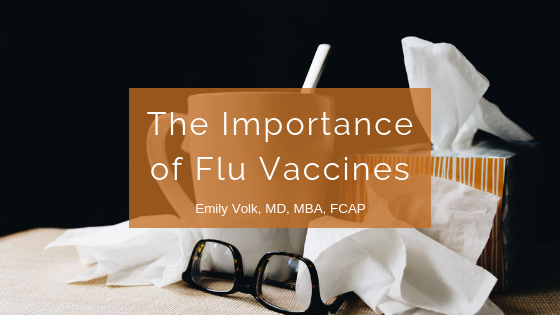Every fall, the public starts to hear promotions urging people to get their influenza vaccination. This is something that is suggested every year, but over time some people may start to distance themselves from the urgency of the vaccination, and become desensitized from the issue altogether. However, that can be a huge mistake for anyone who fails to protect themselves or their loved ones from influenza, more commonly known as the flu.
Influenza is a viral disease that can be serious enough to require hospitalization, and in some cases can be so severe that it leads to death. The effect the flu has on an individual patient depends on their underlying health. Patients who are elderly and frail or very young with less well developed natural bodily defenses are the most vulnerable to the flu’s most damaging effects. The frightening part is that a relatively minor bout of flu in a 25-year-old healthy person can be transmitted to a less robust family member with devastating effect. The average flu season typically runs from fall to the beginning of spring. The viral strains, or the specific type of influenza virus, can vary each year. Medical researchers work each year to study common virus strains to predict the needs for the vaccine for the next flu season. The flu can also vary in terms of the effects it has on each different person.
Symptoms of the flu include coughing, fever, headaches, sore throat, and a runny nose. Every year, millions of people are infected with the flu, and it typically hospitalizes hundreds of thousands of people. During the 2017-2018 flu season, its estimated that over 80,000 people died from the flu. Some people have a higher-sick of catching the flu, including pregnant women, children, the elderly, those who suffer from chronic medical conditions, people who have a BMI higher than 40, and anyone in the caregiving or nursing occupation.
Once you receive your vaccination, it will take about two weeks for the antibodies that protect against the flu to properly develop in your body and bloodstream. Once that two week period is over, the flu vaccine can keep you from getting sick with the flu.
I have heard that some people do not receive the vaccination is because they have heard it “causes the flu”. Although, the flu vaccination can cause side effects to include a low-grade fever, aches, and soreness where the shot was injected. These symptoms when they occur usually last less than 24 hours. It is also possible for someone who received the vaccine to get sick with the flu if the strain is not covered by the vaccine or because exposure occurred before receipt of the vaccination. That being said, the benefits far outweigh the risks, not only for themselves but also for their loved ones and their community.
